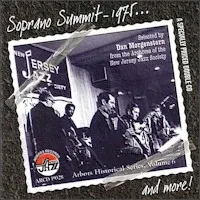
Styles: Saxophone Jazz
Year: 1962
File: MP3@320K/s
Time: 79:47
Size: 189,2 MB
Art: Front
(3:16) 1. Domino
(3:41) 2. Meeting On Termini's Corner
(3:13) 3. Time
(3:40) 4. Lament
(5:06) 5. A Stritch In Time
(2:35) 6. 3-In-1 Without The Oil
(4:50) 7. Get Out Of Town
(3:47) 8. Rolando
(4:26) 9. I Believe In You
(2:36) 10. E.D.
(4:12) 11. Where Monk And Mingus Live / Let's Call This
(4:07) 12. Domino
(3:15) 13. I Didn't Know What Time It Was
(2:18) 14. I Didn't Know What Time It Was
(2:21) 15. I Didn't Know What Time It Was
(2:37) 16. Someone To Watch Over Me
(3:38) 17. Someone To Watch Over Me
(2:35) 18. Termini's Corner
(2:28) 19. Termini's Corner
(2:45) 20. Termini's Corner
(4:10) 21. Termini's Corner
(2:48) 22. When The Sun Comes Out
(2:05) 23. When The Sun Comes Out
(2:44) 24. When The Sun Comes Out
(0:22) 25. Time Races With Emit
When Roland Kirk (pre-Rahsaan) issued Domino in 1962, the album contained 10 tracks, which amounted to just over half an hour of music. On this reissue there are 25 tracks and nearly 80 minutes of music. What’s more, the 15 bonus tracks feature a 22-year-old Herbie Hancock, who did not appear on the original Domino at all. (Getting left on the cutting-room floor must not have thrilled the young pianist.) Bassist Vernon Martin is featured throughout all the sessions. Six of the original 10 tracks feature Andrew Hill on piano and Henry Duncan on drums, both of whom are replaced on the remaing four by Wynton Kelly and Roy Haynes, respectively. Haynes stays on for the tracks that feature Hancock. (No other Hancock/Haynes collaborations come to mind.) So in addition to what this reissue says about Kirk’s enormous talents, it is also of historical interest for its stellar cast of supporting players. Kirk’s arsenal includes two unusual instruments, the manzello (sort of like a soprano sax) and the stritch (like a mellow alto), in addition to tenor, flute, and the occasional siren whistle, usually to introduce a piano solo. His simultaneous two- and three-horn work led some to dismiss him as a gimmick player, which was absurd, for what’s astonishing about the technique is its sheer musicality in Kirk’s hands. Need to ratchet up the intensity over a pedal point or during a solo? Add another horn or two and you’ve got an instant one-man shout chorus. (Check out his faster-than-usual reading of J.J. Johnson’s "Lament" for a good example of this.) And mind you, this is not mere noisemaking his note choices, whether unisons or two- and three-part harmonies, make perfect sense. Indeed, for a musician often thought of as incurably odd and left-of-center, Kirk’s rootedness in tradition couldn’t be clearer on Domino. On tenor he sounds not unlike Sonny Rollins; his flute work surely influenced Thomas Chapin. On the fast minor blues "Rolando" he plays a stritch solo full of exemplary post-bop lines. "E.D.," the last of the original 10 tracks, is a furiously fast reworking of "Tea for Two." At least at this stage, Kirk’s playing was far more inside than Ornette Coleman’s, for instance.
Perhaps this reissue will prompt a reappraisal of Kirk’s importance. As someone who took the tradition seriously and yet created something entirely new from it, he has a great deal to say to today’s like-minded younger generation of players. ~ David Adler https://www.allaboutjazz.com/domino-roland-kirk-verve-music-group-review-by-david-adler.php
Personnel: Roland Kirk, tenor saxophone, manzello, stritch, flute, nose flute, siren whistle; Vernon Martin, bass; Andrew Hill, piano (tracks 1-6, celeste on track 3); Wynton Kelly, piano (tracks 7-10); Herbie Hancock, piano (tracks 11-25); Henry Duncan, drums (tracks 1-6); Roy Haynes, drums (tracks 7-25)
Domino







